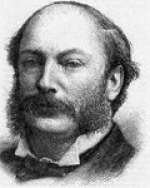Rayleigh, Lord (Physics & Chemistry)
Rayleigh, Lord
| Topics: |
Lord Rayleigh, born John William Strutt (1842-1919), an English physical scientist who made discoveries in the fields of acoustics and optics fundamental to the theory of wave propagation in fluids. In 1861, he began school at Trinity College in Cambridge, England, studying mathematics. He graduated four years later but remained at the college, working under a fellowship until 1871 when he married. Between 1877 and 1878, his work Theory of Sound was published in two separate volumes. Rayleigh received the Nobel Prize for Physics in 1904 for his successful isolation of argon, an inert atmospheric gas. Notable of his early work was his theory explaining the blue color of the sky as the result of the scattering of sunlight by small particles in the atmosphere. The concept of Rayleigh Scattering, which evolved from this theory, has since become classic in the study of wave propagation.
